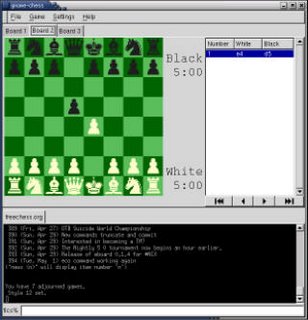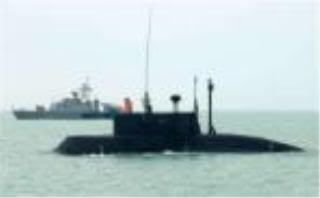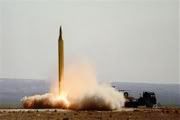Saturday, April 08, 2006
Teaching Children about the Events that Shape Our Lives
 During dinner with an old high school buddy today, the topic moved, as it so often does, to the dangers that face our society today. We were noting that many of these dangers will have more impact on our children, and yet our children seem someone apathetic to the events of the world. These children will benefit from our successes and will suffer the consequences of our mistakes, and yet they seem not to care about the moves that we, as a society, make.
During dinner with an old high school buddy today, the topic moved, as it so often does, to the dangers that face our society today. We were noting that many of these dangers will have more impact on our children, and yet our children seem someone apathetic to the events of the world. These children will benefit from our successes and will suffer the consequences of our mistakes, and yet they seem not to care about the moves that we, as a society, make.
Now on one hand, it’s important for children to experience the care-free life of youth, to not have the weight of the world upon their shoulders. But on the flip side, if children do not find their voice today on some issues, their voices may not make a difference when they’re older and looking at the world around them. If we are responsible for providing our children with a better tomorrow, than are we shirking our duties by not helping them understand these issues while they can make a difference?
Is the responsible thing to protect children’s innocence, to make sure they can experience the childhood everyone deserves? Or is it more responsible to protect the children’s future, to help them understand the pertinent current issues and find their own voice? I believe the answer lies between the two alternatives, balancing a fine line that allows the children to understand issues better and examine them on their own terms, determining what issues are important to them.
Now, I should mention first that I have no children of my own yet, that I’m not even married. I do teach religious school, though, 7th grade, and part of the curriculum is current events. I find myself continually challenged to avoid pushing my own opinions or negativity on the children, but I still feel that the current events section of the class is the most important thing I do, helping to teach children how to analyze the world around them.
When I lived in Israel, I was always struck by how aware the children were of the events that could affect their lives. But it never dampened their moods, even when it came time to speak out about a particular issue. And thus it is apparent to me that children can handle these issues, and that they can do so without losing the genuine happiness required for proper development. The key is getting children in the West to care as much as children, who face these issues on a more imperative basis, like the children in Israel.
It starts by getting the children to question issues. I’m a big believer in the reward strategy; find the appropriate reward, and offer it for each article that your child can report on to you and the family. In some ways, it’s better if you know nothing about the issue before hand, because then the child can’t be influenced by your opinions. And ask many questions, forcing your children not only to read or watch the news, but to understand it more thoroughly.
Also make sure to ask questions not only about the present implications of a news story, but about the future implications of a news story. For example, it’s fantastic that your child knows that global warming is melting the polar ice caps. But understanding that the melting of the polar ice caps can cause storms to be more intense and destructive helps them understand the implications of global warming to them (of course there are far more implications, but this is post on education, not global warming).
I have a small class, and when we first started doing current events, I would tell them what was going on in the news and we would discuss these topics. They got excited to hear about events, but never absorbed them. When I moved to a new program, where each week one student finds an article to report on, and we all discuss it (as well as any other topics the kids know about), the students really began to understand the issues, how they play into the makeup of the world and how these issues affect them personally.
Over the past few weeks, we’ve seen another change too: now instead of the one child bringing in an article to report on and discuss with the class, more and more other children have been bringing in articles on their own. The last two classes everyone has had some news story to report on. The kids are excited to discuss the issues, and everyone has opinions, making it easier for me not to push my views on the children; frankly, I rarely get a word in edgewise, save to make sure everyone is able to get their opinions heard.
And now the children are starting to look for ways to let their own voices be heard, which is more than fantastic. They’ve learned on their own how to critically analyze the articles they are reading, and to come to their own conclusions. These new skills will help them create the world and the lives that they want for themselves. What greater gift could I give these children?
I’m a big believer in pushing children to think about current events. I believe that, only by forcing children to question the events that shape their lives will they be able to create a future that they will want to live in, and that it is possible to provide these skills without stealing away the bliss and happiness that should accompany childhood. It does not require a wealth of knowledge from parents or educators to get children to question current events. It only requires a supportive voice and a bit of incentive to help children seize their own destiny.
Quickly, I do want to add that, again, I am not a parent, and while I try to be a good educator I am, and always will be, learning. Still, I do believe that teaching children to analyze current events is one of the most important things I’ll ever do. If you have any good techniques for educating children on the issues that face the world today without scaring them and while forcing them to come to their own conclusions, I would love to hear. Please provide any suggestions you have in the comments section. Thanks for your opinions.
technorati tags: Children, Teach, Current Events
Read more-->
Posted by Scottage at 3:43 AM /
| |

Friday, April 07, 2006
Playboy Middle East: The Controversy Heightens

Playboy has
released the first edition of Playboy for Indonesia, home to the most populous Muslim community in the world. So tell me, are you surprised that more than a few people are upset about this? Not me, I saw it coming a million miles away when the new locale was announced for the 53 year old magazine with massive distribution and questionable ethics. And it’s only just beginning, folks, only just beginning!
First off, let’s make it clear that the publication of an edition of Playboy in Indonesia makes absolute sense. Indonesia maintains a secular government, supposedly tolerant of all religions despite 85% of the 220 million citizens being Muslims. But the country maintains a thriving pornography trade, much of which makes the current version of Playboy look tame. Even the mainstream pornography is more graphic than the United States Playboy, and Indonesia’s version is of Playboy is far tamer.
This is the 20th geography-specific version of Playboy to go into publication, as Playboy tries to appeal to new markets and increase their already large share of the lucrative pornography market. And recognizing the challenges of entering such a volatile arena, Playboy responded with a very conservative issue, including no nudity, no racy sex talk, really nothing very controversial.
"I didn't see any surprising thing in this magazine. It depends on how people interpret it. For me, no problem," Alex, a white-collar worker who did not want to give his full name, told Reuters Television.
But that has not abated the controversy. Militant groups are definitely up in arms over the publication, and threatening to take matters into their own hands.
Tubagus Sidiq, a senior leader of FPI (the Islamic Defenders’ Front), told Reuters: "FPI opposes (Playboy) in whatever form. According to our commitment, if they don't withdraw it then we will act in our own way, the forceful way. Our crew will clearly hound the editors ... We even oppose the name Playboy."
Demand is very high for the magazine, and people who can get their hands on the mag are passing it around in their office places as curiosity abounds. Still, resellers are afraid to carry Playboy, which isn’t too surprising.
"I am afraid to sell the first edition because it has been reported that the Islamic organizations would be on alert," said newsstand owner Ronni, 30, who operates near the headquarters of hardline Muslim group FPI.
Excellent bloggers, like
ShrinkWrapped, have mistakenly come to the conclusion that the issue is one of Islam not being progressive on their views of women and sexuality. But we’re talking about Indonesia, one of the largest pornography markets in the world. This is not a case of being prudish about sexuality or looking to mask female sexuality.
Rob’s Blog sees the lack of nudity as proof that the claims of the Muslim conservatives against the magazine were unfounded, and that these people should just choose not to buy if they don’t like the product, instead of attacking the product before they know the moral content of it.:
"Moral terrorism"? That has to be the most idiotic thing I've ever heard. Permission granted to simply not buy the friggin' magazine! I'm sure the protests will be very sensible...if by "sensible" they mean "bloody, explosive riots".
The problem is, the issue at hand really isn’t the content; the issue that is causing so much umbrage with the conservative Muslim community in Indonesia is the US spreading our values into Muslim society. Let’s face it, Indonesia obviously has no problem with pornography, as long as its Indonesian pornography. But the presence of the American magazine name, Playboy, which is the issue. Even the government has made it clear that the magazines don’t violate the laws.
"The laws that we can use in this case (are) whether there is a publication that violates decency. So, we need to check the content first. Just using the name is insufficient to ban it," Information Minister Sofyan Djalil told reporters.
Bambang Kuncoko, a national police spokesman, said at a news conference that "the public should follow the law and must not take arbitrary actions. If that happens, the police will absolutely take legal actions."
Despite that , FPI protestors met with Playboy publishers in Jakarta, where most street corners include sidewalk vendors with pornographic movies. But evidently protests against the magazine will commence. Perhaps because, when trying to be sensitive to the Muslim people, they didn’t realize that it was the words, not the pictures, that would really set off the Muslim people, spreading Western moral values. Or perhaps because the magazine would never be given a chance in a Muslim society.
Either way, the conservative Muslim voice in Indonesia, and maybe in other countries, will be heard on this issue. Maybe it will be heard louder than the Muslim voice during the Mohammed Cartoon protests, maybe not. But the voice will be heard, and will continue to grow louder with each issue it speaks out against.
technorati tags: Playboy, Indonesia, Muslim, Islam, Nudity, Sex, Pornography,
Read more-->
Posted by Scottage at 2:46 PM /
| |

Another Blogger Making a Difference: Zeyad of Healing Iraq

In the
Wall Street Journal today, I became acquainted with another hero of the Blogosphere:
Zeyad. Zeyad is a blogging dentist from Iran, and he tells it like it is, perhaps giving one of the truest accounts of day-to-day life in Baghdad.
Zeyad is a Sunni agnostic and author of the blog
Healing Iraq, and has been writing, providing photos, and even occasional videos since October 2003. That’s certainly not the safest hobby in downtown Baghdad, nor the most common in a city where people are far more likely to choose TNT to IBM, but this doesn’t stop Zeyad from giving the world a real account of life in the war-torn city.
For example, in the March 24th post titled “Lynchings and Holy Wars", Zeyad describes and presents a video of the lynching of the Imam and preacher of the Al-Sabbar mosque, Sheikh Ghazi Al-Zoba’i. The crazy part is the normal life existing around this horrible scene. “You can see children running about, stores open, religious holiday flags and even a traffic jam. Perhaps Ralph Peters will happen to drive by with an American army patrol and enjoy the scene of children cheering for the troops, while wondering where his civil war is, dude.”
April 6, Zeyad wrote a photo-journal of the streets in Baghdad, flooded from the overflowing sewage systems. Perhaps most remarkable is the picture of power transformers (tranducers?) behind iron bars to prevent looters. There is Arabic graffiti which reads: "Enough sabotage with.. (illegible text). Preserve the people's property the same as you preserve your mother and sister. You have no zeal or honour. Your fate is death."
I have lived in cities immersed in civil war before, and I thoroughly believe that the level of chaos in one of these cities is directly related to the amount of power the insurgency or insurgencies hold versus the amount of power held by the government. If the insurgency grows more powerful than the government, life descends into total chaos. This is where Iraq stands now, and life has become unbearable. You have to feel for the residents of the city.
From the same post, Zeyad comments on whether Iraq is in a state of civil war:
Please don’t ask me whether I believe Iraq is on the verge of civil war yet or not. I have never experienced a civil war before, only regular ones. All I see is that both sides are engaged in tit-for-tat lynchings and summary executions. I see governmental forces openly taking sides or stepping aside. I see an occupation force that is clueless about what is going on in the country. I see politicians that distrust each other and continue to flame the situation for their own personal interests. I see Islamic clerics delivering fiery sermons against each other, then smile and hug each other at the end of the day in staged PR stunts. I see the country breaking into pieces. The frontlines between different districts of Baghdad are already clearly demarked and ready for the battle. I was stopped in my own neighbourhood yesterday by a watch team and questioned where I live and what I was doing in that area. I see other people curiously staring in each other’s faces on the street. I see hundreds of people disappearing in the middle of the night and their corpses surfacing next day with electric drill holes in them. I see people blown up to smithereens because a brainwashed virgin seeker targeted a crowded market or café. I see all that and more.
No question, definite food for thought, and important to understanding the nature of the War in Iraq, and the effects of our military incursion there. And what’s more, Zeyad blogs despite tremendous adversity. The Wall Street Journal article speaks to the dangers which Zeyad faces as he writes his blog:
Zeyad used to post his last name and a photo on the site, but security concerns led him to stop. He never writes in Baghdad Internet cafes for fear that a militant might see him writing in English and target him as a collaborator, relying instead on a satellite Internet connection to his house. He speaks with other Iraqi bloggers regularly by email but has never met most of them because of the dangers of trying to gather in one place.
Not only has Zeyad’s level of safety deteriorated, but his views have changed as well:
Zeyad's early essays were full of optimism, but his writings now detail the impact the daily violence is having on his physical and mental well-being. "I used to think that the media wasn't reporting the good news from Iraq, but now I think it's the opposite," Zeyad says in a phone interview. "You have the deportations, kidnappings and sectarian killings. But you don't hear about them. All you hear about are the bombings."
And has a result, the content of his writing has changed:
Zeyad has used his site to detail a growing list of personal tragedies and close calls tied to the war. His younger brother was roughed up by Iraqi soldiers, who saw him fidgeting with his cellphone and assumed he was an insurgent, and several friends had cars or houses damaged in American raids. One of his cousins drowned after U.S. soldiers in the restive city of Samarra ordered him to jump off a bridge over the Tigris River. Zeyad wrote about the case on his site for months until the U.S. military acknowledged wrongdoing and formally reprimanded the four soldiers involved. The day the U.S. response was announced, Zeyad posted an essay titled "Justice."
Zeyad has been invited to the White House. The Washington Post published an
op-ed piece on Zayed on March 19th. And Technorati shows 348 blogs linked to Zeyad, putting him in the top .01%. Well, now it’s 349….I’m linking, and I’ll be reading regularly. Zeyad is planning a move to New York to go to school for journalism, but as long as he’s in Iraq, I’m definitely reading.
technorati tags: Zeyad, Iraq, Healing Iraq, Blog
Read more-->
Posted by Scottage at 2:14 AM /
| |

Tuesday, April 04, 2006
Ding, Dong, DeLay is Dead; Oops, Maybe I spoke too soon

Well not dead exactly, more like retired. And yet I’m not even sure if that’s true, as it looks like Tom Delay may already have found a life for himself as a lobbyist. But he is no longer a member of the house, and that’s a great start (in my humble opinion)! Wait, no, he actually only announced his intention to leave the house, and didn’t even specify a date, just said it would depend upon the congressional calendar. Damn, this guy just won’t go away!!!
Tom DeLay has been hamstrung by allegations of political corruption stemming from the Jack Abramoff incident, and as more and more facts are revealed, there certainly appears no question that the ties between Abramoff and DeLay were strong. Only time will tell the level of criminal culpability that must be shouldered by DeLay, but even the staunchest Republicans are saying that Delay’s hands are not entirely clean in this case. Whether or not he is deemed to have performed illegal actions, certainly a many of his religious convictions will recognize he has a confession or two to make.
He’s not the first, of course, to get his hand caught in the cookie jar, and by no means is he the worst. But look back over the resignation speeches of the leaders who have fallen to similar circumstances, and you see basic similarities which are not found in this speech: an immediate or definite departure date from office, an apology for any wrong doings, a list of accomplishments and why we still can feel positive about the work of the politician, a message of healing and an appeal for unity to move the country past the incident, and a confirmation of the honor of the position. DeLay’s speech only contains the list of accomplishments, and forgets the rest, a true testament to DeLay’s legacy.
Let’s compare Tom DeLay’s “resignation” speech with that of Richard Millhouse Nixon after Watergate.
Nixon begins by describing the circumstances that led up to his resignation. He notes that throughout his life, and during the Watergate period, he has “always tried to do what was best for the Nation”. “The interest of the Nation must always come before any personal considerations.” “Therefore, I shall resign the Presidency effective at noon tomorrow. Vice President Ford will be sworn in as President at that hour in this office.” “I regret deeply any injuries that may have been done in the course of the events that led to this decision. I would say only that if some of my Judgments were wrong, and some were wrong, they were made in what I believed at the time to be the best interest of the Nation.” These are of course snippets with fuller description of the deteriorating power base in between, but these are the most relevant lines.
DeLay does not lead with his resignation, but instead buries it after the list of accomplishments nearly 3 pages long. There, he states his intentions and time tables:
Because I care so deeply about this district and the people in it, I refuse to allow liberal Democrats an opportunity to steal this seat with a negative, personal campaign.
The voters of the 22nd District of Texas deserve a campaign about the vital national issues that they care most about and that affect their lives every day, and not a campaign focused solely as a referendum on me.
So today, I am announcing my intention to resign my seat in the House. I will make that resignation effective sometime before mid-June, but largely dependent on the congressional calendar. I plan to begin focusing on the next phase of my life as a private citizen.
With regards to Jack Abramoff, DeLay categorically denies the incident, and instead tries to push a larger wedge between the republic and democratic parties.
I have no fear whatsoever about any investigation into me or my personal or professional activities. As one of my colleagues in the House leadership astutely observed a while back, the wheels of justice turn much more slowly than the wheels of allegation. I will be quite content to be judged when the passage of time has provided both all of the facts and a greater sense of perspective than is possible for most today. As difficult as this decision has been for me, it's not going to be a great day for liberal Democrats, either.
So much for the apology for any wrong doings. Nixon goes on to look after the good of the nation, and to call for the beginning of the healing process.
In passing this office to the Vice President, I also do so with the profound sense of the weight of responsibility that will fall on his shoulders tomorrow and, therefore, of the understanding, the patience, the cooperation he will need from all Americans.
As he assumes that responsibility, he will deserve the help and the support of all of us. As we look to the future, the first essential is to begin healing the wounds of this Nation, to put the bitterness and divisions of the recent past behind us, and to rediscover those shared ideals that lie at the heart of our strength and unity as a great and as a free people.
By taking this action, I hope that I will have hastened the start of that process of healing which is so desperately needed in America.
DeLay’s comments are far less about healing and far more about derision and destruction:
Having served under Republican and Democrat control in the House, I know first hand how important it is for Republicans to maintain their national majority. A Democrat Congress in 2007 would, without doubt or remorse, raise hundreds of billions of dollars in taxes, summarily cut and run from the war on terror, and immediately initiate an unconstitutional impeachment of President Bush.
However certain such antics might make a Republican resurgence in 2008, the times are too grave to waste even two years in the life of this nation...and allow even one more vote for their agenda of pessimism and failure.
Add in the line “We still need to redesign government” and his list of objectives, and you can’t help but wonder if the guy understands that he has an obligation to help rebuild what he has helped destroy: the average citizen’s trust in the government.
Finally, look at the reverence Nixon shows to the office:
When I first took the oath of office as President 51/2 years ago, I made this sacred commitment, to "consecrate my office, my energies, and all the wisdom I can summon to the cause of peace among nations."
I have done my very best in all the days since to be true to that pledge. As a result of these efforts, I am confident that the world is a safer place today, not only for the people of America but for the people of all nations, and that all of our children have a better chance than before of living in peace rather than dying in war.
This, more than anything, is what I hoped to achieve when I sought the Presidency. This, more than anything, is what I hope will be my legacy to you, to our country, as I leave the Presidency.
To have served in this office is to have felt a very personal sense of kinship with each and every American. In leaving it, I do so with this prayer: May God's grace be with you in all the days ahead.
And compare to DeLay:
I have no regrets today, and no doubts.
I am proud of the past. I am at peace with the present.
And I am excited about the future, which holds, as always, America's brightest days... and mine, too.
Thank you, and may God bless you all. He has certainly blessed me.
DeLay is absorbed in himself and partisn politics, but not in the good of the country. This speech shows, in my opinion, that the man has no class. Sorry, Tom, but I’ll be glad when your voice is muted from the political scene.
technorati tags: DeLay, Tom DeLay, Abramoff, Nixon, Watergate, Resign
Read more-->
Posted by Scottage at 6:20 PM /
| |

Thankfully, Jessica Alba!
Hey all,
It has been a really tough day, and I totally apologize to the great messages that were posted here that remain unanswered; I will have to get to them tomorrow, but I promise I will. In the interim, there aught to be a law against days like this, so I'm putting up a less-serious post to remind that smiles are necessary. So, without further ado, Jessica Alba looking, sexy, naked and hot! Gotta love it.
 ..........
..........
technorati tags: Jessica Alba, Naked, Bikini, Sexy

Read more-->
Posted by Scottage at 2:00 AM /
| |

Iranian War Games: The Chess Match Continues
Are you a chess player? I really enjoy the game, and while I’m not great at it, I can hold my own. I have one friend (I say that loosely as we haven’t spoken in probably a year now) who I used to always play against; we are at similar levels, both competitive about the games, and we normally split our games. Most games involve similar openings, and while I’m sure there’s a name for the opening, I can only describe it, at tell you that we are seeing it played out in real life by Iran. We are in the middle of a chess match, my friends, and the stakes could not be higher!

To begin the game, you move your Queen’s pawn out two spaces, putting it in a position which you can fortify to take some control over the center 4 spaces in the board. Most chess people will tell you the game is won or lost in controlling the center four spaces on the chess board, and by moving out your pawn, you take quick control of your side of the territory, and threaten your opponent’s side of the territory. Normally this will cause your opponent to move his king’s pawn up 2 spaces, threatening your king, but clearly a defensive move, protecting the board’s center. And the tone for the entire conflict is set.
In the conflict of West vs. Middle East, with main players being the United States and Iran, the middle grounds are clear: for the West, Europe is the central territory, where for Iran, the Mediterranean region, with heavy emphasis on Israel, Syria and Egypt, is the central squares.
If you allow this analogy, then Iran moved out its first pawn with the Mohammed Cartoon Protests. I spoke about this extensively in a
February 17th post, so you can refer there for more information (sorry about the formatting, Blogger sucks). But the basics is that these protests were not a natural reaction to the cartoons, as most of us accept, but that they were contrived by, predominantly Iran and it’s ally Syria. The post then theorizes that this move was meant to specifically put the West, predominantly Europe, on the defensive, which it did, even causing renunciations of our basic freedoms that continue
today.
In the chess game, you are on the attack; you want to continue in that direction, but flexing your muscles a bit, giving your opponent many possible modes of attack for upcoming moves. The move to make is moving out the king side knight. The knight protects your pawn, attacks your opponents pawn, and also supports a wide variety of moves that you can make on the attack on your next turn. The key is clearly the flexibility of the knight, the variety of squares that can be protected, or which the knight can move to either to attack or to set up the next attack. Plus, most importantly, it creates a corridor behind the pawn that can be used by the king side bishop and the knight to attack the queen.
Iran’s knight? This week we have been seeing war games in Iran, which Iran states are to “gain the necessary and needed readiness to decisively reply to any kind of threats." But really these war games have been an exhibition of Iran’s new military capability (or supposed capability, depending on who you listen to). They are the introduction of a weapon, the Iranian military that can attack or defend with a great deal of flexibility, based on the specific needs of any specific conflict.

Sunday, Iran
announced the successful test of an underwater missile with a speed of, get this, 223 mph! What the hell?!?!? This is 3-4 times faster than your average torpedo, and is the same speed as the Russian VA-111, the fastest waterborne object. China and Germany have been trying to replicate the technology since 2004. But this missile has a huge advantage over the VA-111 – it can house a warhead. It is not clear if the warhead can be nuclear, but regardless, this is a huge development. Plus, to launch it, they tested “midget submarines” capable of firing the missiles. No details there.
Monday, Iran tested a
second torpedo. This torpedo is fired from a surface-bound ship, with enough power to “break a heavy warship” plus the ability to fire down into the water to take out a submarine at any depth. And
tomorrow will be more of the same. “Tomorrow, we will see other missile test firings by the Revolutionary Guards in the 'Great Prophet' war game," Rear Admiral Dehqani told state television, which only gave his family name. They also announced last week a radar-evading missile.
Put these four missiles together, and you see a weapon with the same flexibility of the knight, with the ability to be used for both offense and defense, and the ability to support other offensive moves that could happen in the future. Add in that Iran has conducted the majority of these war games in the
Straights of Homuz, which sees the transportation of 80% of the region’s oil supplies, and a clear corridor has been created right to the heart of the needs of the West.
Still, there are questions as to the validity of the new Iranian weapons, or that they may be exaggerating the new capabilities. Up until now, Iran
has been thought to have a vastly outdated weapons system, which counterbalances the vast number of Iranian troops. But of late they have been trying to increase their own armament production, and this may be the result.
"We know that the Iranians are always trying to improve their weapons system by both foreign and indigenous measures," Pentagon spokesman Bryan Whitman said in Washington. "It's possible that they are increasing their capability and making strides in radar absorbing materials and technology. But the Iranians have also been known to boast and exaggerate their statements about greater technical and tactical capabilities," he said.
The chess game between the West and the Middle East is not your typical chess match, as the Middle East does not have use of its queen yet. Iran’s queen is a nuclear missile, and there are a variety of estimates as to how long it will take for Iran to get a nuke. Today, former UN weapons inspector
Hans Blix said Iran is 5 years away from developing a nuke. But in recent weeks, estimates as low as 3 years have been put forth, and all of those estimates could go out the window if Iran succeeds in purchasing a nuke from Russia, China, or another source.
Still, with the queen not in play, Iran will maintain a slower pace than

we may see otherwise, as the West still holds the significant advantage of being capable of complete devastation. But in the future, we should be looking for the bullet; in the chess game, it would be moving the bishop out so that it is protected by the knight, and so that it attacks the queen and the center of the board simultaneously. This forces your opponent to sacrifice the center to save the queen.
How would this play out? I can’t tell for sure, but I would expect it to come as some sort of challenge both to Israel and the West, where the West cannot defend Israel without considerable sacrifice. Perhaps our oil supply will be threatened, I don’t know. What I do know is that, like in the chess game, you only have two ways to defend against such a situation: either fortify against it before the move is made, or go on the attack so your opponent will sacrifice more than you do. We need to looking for potential lines of attack now, and defending against them, because this move is almost completed, and who knows when the next begins.
technorati tags: Iran, War Games, Chess, Missile, West, Middle East, Conflict, Straights of Homuz
Read more-->
Posted by Scottage at 1:15 AM /
| |

Sunday, April 02, 2006
Gorbachev: America Drunk on its own Power

If a person were asked to compile a list of the most influential people of the 20th century, any list would surely be incomplete without Mikhail Gorbachev. The father of Glasnost and Perestroika (openness and economic restructuring), Gorbachev looked at one of the most powerful nations in history, and restructured it based on his own views of the society. The true beauty of Gorbachev’s philosophies were that they were tied closely enough to the roots of Soviet life to appeal to Soviet on the street This popular support led to the acceptance by the power structure, transformation of the society, and a new age of security throughout the world.
Gorbachev has always been a hero to me. He is a true example of a man with ideas making a difference in the world. Yes, I know these ideas were shared by many, and contributed to by others as well. But somehow Gorby was at the heart of reform in the Soviet Union. He was a master at analyzing what was in front of him, and used his analysis to better his world. Of course I wasn’t alone in seeing this; the world saw it too, and rewarded Gorbachev with the Nobel Peace Prize in 1990. And to me that’s no surprise, as there are few similarly worthy candidates that I have seen during my lifetime.
Thus, I valued the words provided today by the ex-Soviet leader. He was
interviewed by Sally Donnelly in Time, as he prepares to release a book on the 20th anniversary of introducing Perestroika to Soviet society, predominantly talking about the state of Russia today, and the long-term effects of Perestroika. But when he moved to the work being done today to correct the mistakes of the Yeltsin administration, he was openly critical of a Bush administration that does not treat Russia as an equal by any sense of the word.
Donnelly: Is Putin on the Right track?
Gorbachev: Putin is trying to move toward more social-democratic policies--to improve health care, education and the like. But just as Russia is beginning to rise again, the West doesn't accept it. America is intoxicated by its position as the world's only superpower. It wants to impose its will. But America needs to get over that. It has responsibilities as well as power. I say this as a good friend of America.
Donnelly: The U.S. seems worried about some antidemocratic developments in Russia, such as Kremlin control of the media.
Gorbachev: The U.S. should be concerned about Russian domestic issues if Russians are concerned. Yes, the media are under some assault. There are some authoritarian methods being used. That is not in the interests of the people. Democracy is fragile.
Gorbachev is perfectly in line with my philosophies. He knows how fragile the democracy Russia is trying to create is, but he also knows that in any country, including the U.S., there are instances you do what you have to for the country’s good. Now I believe that democracies need to maintain their basic freedoms, as they define a society. But I can say that from within my own society, and there is no sense trying to analyze a society I’m not part of. Only the Russians can decide the line between those basic, unalienable rights that can’t be broken and rights that need to be sacrificed for the public good. My opinion doesn’t count.
Gorbachev then goes on to talk about the direction we’re heading, and he makes some very poigniant statements:
Donnelly: Do you think we are moving back toward a cold war?
Gorbachev: I think some people may be pushing President Bush in the wrong direction. I don't think the U.S. can impose its will on others. This talk of pre-emptive strikes, of ignoring the U.N. Security Council and international legal obligations--all this is leading toward a dark night.
Sorry, but he is so damn smart! Gorbachev quickly boils down the rhetoric so we see the root of the problem; the problem is not the level of democracy being practiced in Russia, nor is it the spread of American values through the media and increase communication that is increasing the rift between Russia and the US, but instead it is the U.S. imposing its will on Russia, as a bully more than a super-power, that is leading us towards conflict.
This is the same issue brought up by the Muslim world. They speak of American imperialism, and we snicker and call them evil. But I have spoken here before about a very real American imperialism, felt throughout the world, and pushing us towards the “dark night” Gorbachev alludes to. While the Bush administration points fingers, the world grows increasingly irritated with the US’ holier-than-thou attitude, as demonstrated by the number of people who spoke about these aspects while I covered the 10 Dangers to the Western World. Indeed, perhaps the US is its own worst enemy.
My bias says that this situation may not be unique to the Bush administration, but it is more pronounced during this administration than it has been at any time during my life. But Gorbachev points out that there is at least one voice of reason in this administration, that being Condoleezza Rice, who I wrote about Friday.
Donnelly: Is Condoleezza Rice one of these people?
Gorbachev: Oh, I don't think so. She is a knowledgeable person, a person who knows Russia, a cultured person. She is one who is committed to political and diplomatic solutions. But she is having a difficult time. So did Colin Powell.
I have actually been reading some Rice statements this weekend, and I’m becoming more and more convinced that, should she run for office in 2008, she might be a very good candidate. I know that there are many voices of dissent out there, people who have written here that they object to Rice on every level. But the more I read of her public statements, the more I wonder how much of that comes from being associated with a Bush administration that has often forced her to backtrack over statements she obviously believed in. Guilt by association would not dissuade me from voting for her if Rice did turn out to be the leader this country so desperately needs.
As for Gorbachev, I’m glad to see his statements, and I hope that that somewhere in our government they see that these statements came from a true voice for democracy, and take heed. I doubt it will happen, but I can be hopeful. When his book comes out, I will read it. And I will continue to remember that Gorbachev really stands for the power of ideas, and the ability for one person to make a huge difference in this world.
technorati tags: Gorbachev, Putin, Soviet Union, Russia, Bush, Bush Administration, Condoleezza Rice, Muslim, Perestroika, Glasnost
Read more-->
Posted by Scottage at 10:56 PM /
| |



 During dinner with an old high school buddy today, the topic moved, as it so often does, to the dangers that face our society today. We were noting that many of these dangers will have more impact on our children, and yet our children seem someone apathetic to the events of the world. These children will benefit from our successes and will suffer the consequences of our mistakes, and yet they seem not to care about the moves that we, as a society, make.
During dinner with an old high school buddy today, the topic moved, as it so often does, to the dangers that face our society today. We were noting that many of these dangers will have more impact on our children, and yet our children seem someone apathetic to the events of the world. These children will benefit from our successes and will suffer the consequences of our mistakes, and yet they seem not to care about the moves that we, as a society, make. 
 Playboy has released the first edition of Playboy for Indonesia, home to the most populous Muslim community in the world. So tell me, are you surprised that more than a few people are upset about this? Not me, I saw it coming a million miles away when the new locale was announced for the 53 year old magazine with massive distribution and questionable ethics. And it’s only just beginning, folks, only just beginning!
Playboy has released the first edition of Playboy for Indonesia, home to the most populous Muslim community in the world. So tell me, are you surprised that more than a few people are upset about this? Not me, I saw it coming a million miles away when the new locale was announced for the 53 year old magazine with massive distribution and questionable ethics. And it’s only just beginning, folks, only just beginning!
 In the Wall Street Journal today, I became acquainted with another hero of the Blogosphere: Zeyad. Zeyad is a blogging dentist from Iran, and he tells it like it is, perhaps giving one of the truest accounts of day-to-day life in Baghdad.
In the Wall Street Journal today, I became acquainted with another hero of the Blogosphere: Zeyad. Zeyad is a blogging dentist from Iran, and he tells it like it is, perhaps giving one of the truest accounts of day-to-day life in Baghdad. 
 Well not dead exactly, more like retired. And yet I’m not even sure if that’s true, as it looks like Tom Delay may already have found a life for himself as a lobbyist. But he is no longer a member of the house, and that’s a great start (in my humble opinion)! Wait, no, he actually only announced his intention to leave the house, and didn’t even specify a date, just said it would depend upon the congressional calendar. Damn, this guy just won’t go away!!!
Well not dead exactly, more like retired. And yet I’m not even sure if that’s true, as it looks like Tom Delay may already have found a life for himself as a lobbyist. But he is no longer a member of the house, and that’s a great start (in my humble opinion)! Wait, no, he actually only announced his intention to leave the house, and didn’t even specify a date, just said it would depend upon the congressional calendar. Damn, this guy just won’t go away!!!
 ..........
..........


 To begin the game, you move your Queen’s pawn out two spaces, putting it in a position which you can fortify to take some control over the center 4 spaces in the board. Most chess people will tell you the game is won or lost in controlling the center four spaces on the chess board, and by moving out your pawn, you take quick control of your side of the territory, and threaten your opponent’s side of the territory. Normally this will cause your opponent to move his king’s pawn up 2 spaces, threatening your king, but clearly a defensive move, protecting the board’s center. And the tone for the entire conflict is set.
To begin the game, you move your Queen’s pawn out two spaces, putting it in a position which you can fortify to take some control over the center 4 spaces in the board. Most chess people will tell you the game is won or lost in controlling the center four spaces on the chess board, and by moving out your pawn, you take quick control of your side of the territory, and threaten your opponent’s side of the territory. Normally this will cause your opponent to move his king’s pawn up 2 spaces, threatening your king, but clearly a defensive move, protecting the board’s center. And the tone for the entire conflict is set. Sunday, Iran announced the successful test of an underwater missile with a speed of, get this, 223 mph! What the hell?!?!? This is 3-4 times faster than your average torpedo, and is the same speed as the Russian VA-111, the fastest waterborne object. China and Germany have been trying to replicate the technology since 2004. But this missile has a huge advantage over the VA-111 – it can house a warhead. It is not clear if the warhead can be nuclear, but regardless, this is a huge development. Plus, to launch it, they tested “midget submarines” capable of firing the missiles. No details there.
Sunday, Iran announced the successful test of an underwater missile with a speed of, get this, 223 mph! What the hell?!?!? This is 3-4 times faster than your average torpedo, and is the same speed as the Russian VA-111, the fastest waterborne object. China and Germany have been trying to replicate the technology since 2004. But this missile has a huge advantage over the VA-111 – it can house a warhead. It is not clear if the warhead can be nuclear, but regardless, this is a huge development. Plus, to launch it, they tested “midget submarines” capable of firing the missiles. No details there. we may see otherwise, as the West still holds the significant advantage of being capable of complete devastation. But in the future, we should be looking for the bullet; in the chess game, it would be moving the bishop out so that it is protected by the knight, and so that it attacks the queen and the center of the board simultaneously. This forces your opponent to sacrifice the center to save the queen.
we may see otherwise, as the West still holds the significant advantage of being capable of complete devastation. But in the future, we should be looking for the bullet; in the chess game, it would be moving the bishop out so that it is protected by the knight, and so that it attacks the queen and the center of the board simultaneously. This forces your opponent to sacrifice the center to save the queen.
 If a person were asked to compile a list of the most influential people of the 20th century, any list would surely be incomplete without Mikhail Gorbachev. The father of Glasnost and Perestroika (openness and economic restructuring), Gorbachev looked at one of the most powerful nations in history, and restructured it based on his own views of the society. The true beauty of Gorbachev’s philosophies were that they were tied closely enough to the roots of Soviet life to appeal to Soviet on the street This popular support led to the acceptance by the power structure, transformation of the society, and a new age of security throughout the world.
If a person were asked to compile a list of the most influential people of the 20th century, any list would surely be incomplete without Mikhail Gorbachev. The father of Glasnost and Perestroika (openness and economic restructuring), Gorbachev looked at one of the most powerful nations in history, and restructured it based on his own views of the society. The true beauty of Gorbachev’s philosophies were that they were tied closely enough to the roots of Soviet life to appeal to Soviet on the street This popular support led to the acceptance by the power structure, transformation of the society, and a new age of security throughout the world.